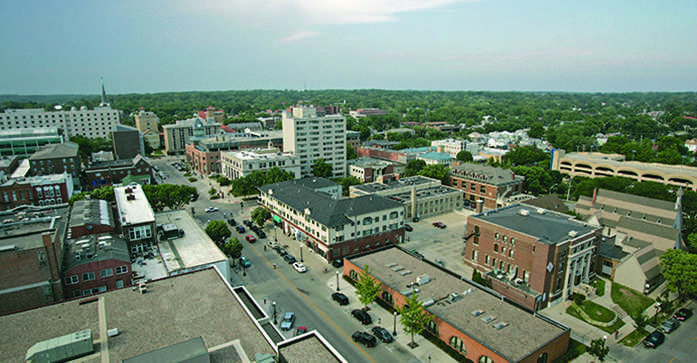An open dialogue on faith promoted intellectual humility but found no easy answers in its quest to answer the question, does religion do more harm or good?
The panel discussion brought a group of religious leaders and academics together on Sunday for a dialogue on religion, but the panelists agreed that it was difficult to come up with a conclusion for several reasons.
The panelist include University of Iowa philosophy Associate Professor Evan Fales, Pastor of Park View Church Dave Foster, UI Lecturer in Biblical Studies Jordan Smith, Hillel Director Gerald Sorokin, and Director of the Downtown Equipping of Grace Community Church Stephen Scheperle.
“Religion is not one thing,” Fales said. “There are several thousand religions. Some of them are very different. I don’t think it’s an easy matter to pick apart who the good guys are and who the bad guys are.”
Sorokin said grouping all religions into a single category is to misinterpret the roles that different religions play for different communities.
“If we look at recent history, we can see evidence on both sides where people acting in the name of religion have done terrible harm,” he said. “At the same time, we can see plenty of cases where people motivated by teachings of their religion, are taking selfless actions, and it’s their religious motivation that pushes them to do things that are helpful.”
Sorokin also cited the absence of Muslims and women at the discussion as an example of lack of diversity when it comes to religious discourse.
The panel further addressed violence perpetrated by individuals based on their religious convictions, both in modern times and in the past.
“We need to stop the demonization of Islamic terrorism,” Fales said. “There is zero effort to understand why these people feel the way they do or if we have any blame to lay at our feet.”
Scheperle noted that violence is also perpetrated by other religions, including Christianity, noting that there is a significant amount of religiously motivated violence within the history of that belief.
“We hardly address the reality of Christian violence. Christians being unaware of this history is unhelpful,” he said. “Knowing this history is necessary for all Christians. At the core of Christianity is suffering and being willing to suffer and undergo violence, rather than to inflict violence on others.”
When it comes to learning about different communities, Smith said, there is little humility and too much demonization in the American society.
“When we demonize somebody, we see them as less than human,” he said. “We don’t listen or have dialogue with each other. We think of ourselves and our group too highly, and we don’t have the humility to realize we’re wrong.”
One speaker related religion to the current political climate.
Foster said too many people in the church are buying into Trump’s vision of right-wing politics, which calls for the creation of a wall along the Mexican border.
“That was not part of what Jesus was about,” he said. “Christianity in its best form would have nothing to do with that. This comes out of a fear of a loss of American life. This has to be undone.”
He cited the failure of today’s Christians to understand the historical roots of their religion as one of the problems of present Christianity.
“Most evangelical Christians have no greater understanding of their belief system than what they experience individually,” he said. “That cannot continue. Being a Christian is not about protecting your way of life, but about giving everything you have for a cause or a mission.”



